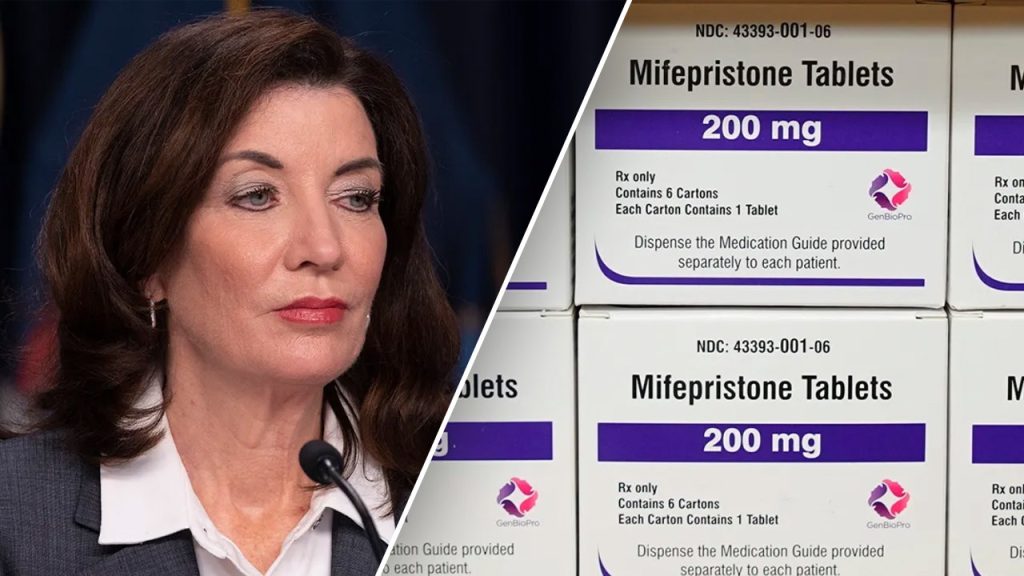Paragraph 1: The Genesis of a Legal Shield
The intersection of abortion rights and interstate legal conflicts reached a new crescendo with the indictment of New York physician Margaret Carpenter in Louisiana. Carpenter, along with her company and an associate, was accused of using telemedicine to prescribe abortion pills to a pregnant minor in Louisiana, a state with near-total abortion restrictions. This case, seemingly the first of its kind since the overturning of Roe v. Wade, sparked immediate action in New York. Governor Kathy Hochul, a Democrat, responded swiftly by signing a bill designed to protect New York doctors who provide abortion medications from similar legal entanglements in other states. This new law, effective immediately, mandates the removal of doctors’ names from abortion pill bottles, replacing them with the name of their healthcare practices. This measure aims to shield physicians from legal jeopardy in states with restrictive abortion laws by obfuscating their individual involvement in prescribing abortion medication.
Paragraph 2: The Louisiana Indictment and its Repercussions
The indictment of Dr. Carpenter stemmed from an alleged incident involving a pregnant minor in Louisiana who experienced a medical emergency after taking abortion medication prescribed via telemedicine. The girl’s mother was also charged in connection with the incident. Crucially, Louisiana authorities learned of Carpenter’s involvement through the medication label, a vulnerability the new New York law directly addresses. District Attorney Tony Clayton, who is prosecuting the case in Louisiana, stated that the arrest warrant for Carpenter is “nationwide,” potentially exposing her to arrest in other states with restrictive abortion laws. This threat underscores the precarious position of healthcare providers operating across state lines in a post-Roe America where abortion access is increasingly fragmented and legally contested.
Paragraph 3: Interstate Legal Conflicts and Abortion Access
The Carpenter case illuminates the complex legal landscape surrounding abortion access in the United States. With the overturning of Roe v. Wade, the regulation of abortion has reverted to individual states, creating a patchwork of laws ranging from near-total bans to protected access. This fragmented legal framework has spurred interstate conflicts, as individuals seeking abortion care may turn to providers in states with more permissive laws, potentially exposing those providers to legal action in their home states or in the states where their patients reside. The New York law represents an attempt to navigate this complex legal terrain and protect healthcare providers from prosecution in other states.
Paragraph 4: New York’s Proactive Defense of Abortion Access
Governor Hochul’s swift action in signing the bill underscores New York’s commitment to protecting abortion access in the wake of Roe’s reversal. By shielding the identities of doctors prescribing abortion medication, the law seeks to prevent other states from targeting New York physicians who provide care to out-of-state patients. This move reinforces New York’s position as a haven for abortion access and sets the stage for potential further legislative action. Hochul has indicated her intention to push for additional legislation requiring pharmacists to cooperate with doctors’ requests to omit their names from prescription labels, further fortifying the protections for healthcare providers.
Paragraph 5: Texas Lawsuit Adds Another Layer of Complexity
Further complicating matters is a lawsuit filed by Texas Attorney General Ken Paxton against Dr. Carpenter in December 2022, alleging that she sent abortion pills to a woman in Texas. Although criminal charges were not filed in the Texas case, the lawsuit highlights the ongoing legal challenges faced by healthcare providers who offer abortion services across state lines. The lawsuit, coupled with the Louisiana indictment, underscores the vulnerability of doctors operating in a legal gray area created by the conflicting state laws surrounding abortion access. These cases represent test cases that could have significant implications for the future of interstate abortion care.
Paragraph 6: The Future of Interstate Abortion Care
The Carpenter case and the subsequent legal actions in New York and Texas highlight the emerging legal battles surrounding abortion access in a post-Roe America. As states increasingly diverge in their abortion laws, the potential for interstate legal conflicts will likely escalate. The New York law represents a proactive attempt to shield healthcare providers from legal repercussions in other states, but the efficacy of this approach remains to be seen. The legal challenges facing Dr. Carpenter, both in Louisiana and Texas, will likely serve as important precedents, shaping the future landscape of interstate abortion care and the ability of individuals to access abortion services across state lines. The clash between state laws and the movement of individuals seeking care will continue to generate legal challenges and ethical dilemmas, with the courts ultimately playing a crucial role in defining the boundaries of abortion access in the post-Roe era.

